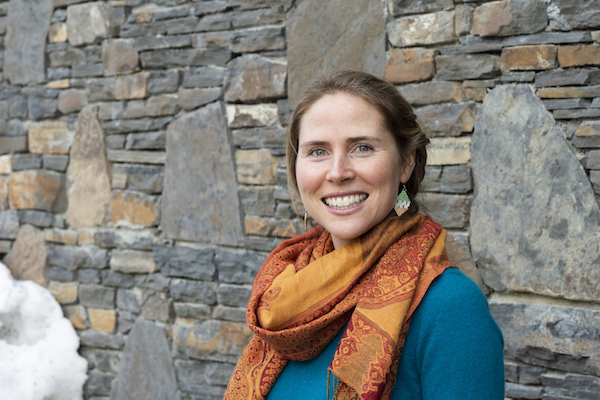Lindsay Borrows successfully defends LLM thesis on Indigenous legal revitalization
Sarah Kent - 10 September 2021

Lindsay Borrows, who successfully defended her master’s thesis at the University of Alberta Faculty of Law on August 24, was drawn to graduate studies after 10 years of community-engaged research on Indigenous legal revitalization.
“I used my LLM as an opportunity to reflect on some of my key learnings from these work experiences (as a legal researcher and a lawyer),” said Borrows, who worked for the non-profit group West Coast Environmental Law and for the University of Victoria’s Indigenous Law Research Centre.
“In particular, I was struck by how often our community partnerships led us outside to learn law on the land, instead of from books or on the computer. My writing weaves these personal narratives together with academic literature on land-based learning, Indigenous law and environmental law.”
Borrows’s thesis, titled "The Land is our Casebook: Revitalizing Indigenous Law in Relation with the Living World,” focuses on Tsilhqot'in law and examines how Indigenous laws flow from the land itself. Her research was co-supervised by Professors Hadley Friedland and Darcy Lindberg, to whom Borrows was grateful for their expertise and support.
“I was able to take courses with both of them that tied into my thesis research and writing. We had organic conversations about my work throughout the year that led me in exciting directions.”
“There were other elements to my LLM beyond research and writing, including courses on ethics and professional development, as well as funding applications along the way,” said Borrows. “I was supported in each of these areas.”
A UNIQUE DEFENCE
While public health measures due to COVID-19 meant that Borrows had to defend her thesis over Zoom, it presented a special opportunity.
“I joined from my grandmother's living room in Ontario,” said Borrows. “She and other members of my family live on reserve at the Chippewas of Nawash First Nation. They are the inspiration for my work. It was special to be surrounded by them for my defence in the very place where I first began learning law on the land.”
“I learned so much from the thoughtful questions asked by my examiners. It was a celebration of the year's work.”
Borrows’s thesis earned high praise from her examining committee, who commented that her strength is “accessible writing. It is a beautiful piece of work.”
Dedicating time to writing her thesis “felt like an immersion in storytelling,” said Borrows, whose list of publications includes Otter’s Journey Through Indigenous Language and Law (2018, UBC Press), a peer-reviewed academic work of creative non-fiction.
Borrows hopes to transform her thesis into a book with the addition of another chapter. She will also extend her master’s research on Indigenous laws with doctoral studies at the Faculty of Law.
“My PhD research will continue to explore questions about how we can learn law in relationship with the natural world,” said Borrows, who started the doctoral program in September. “It is not currently a common practice in Canadian law to view the natural world as animate, and we have a lot to learn from Indigenous legal traditions.”